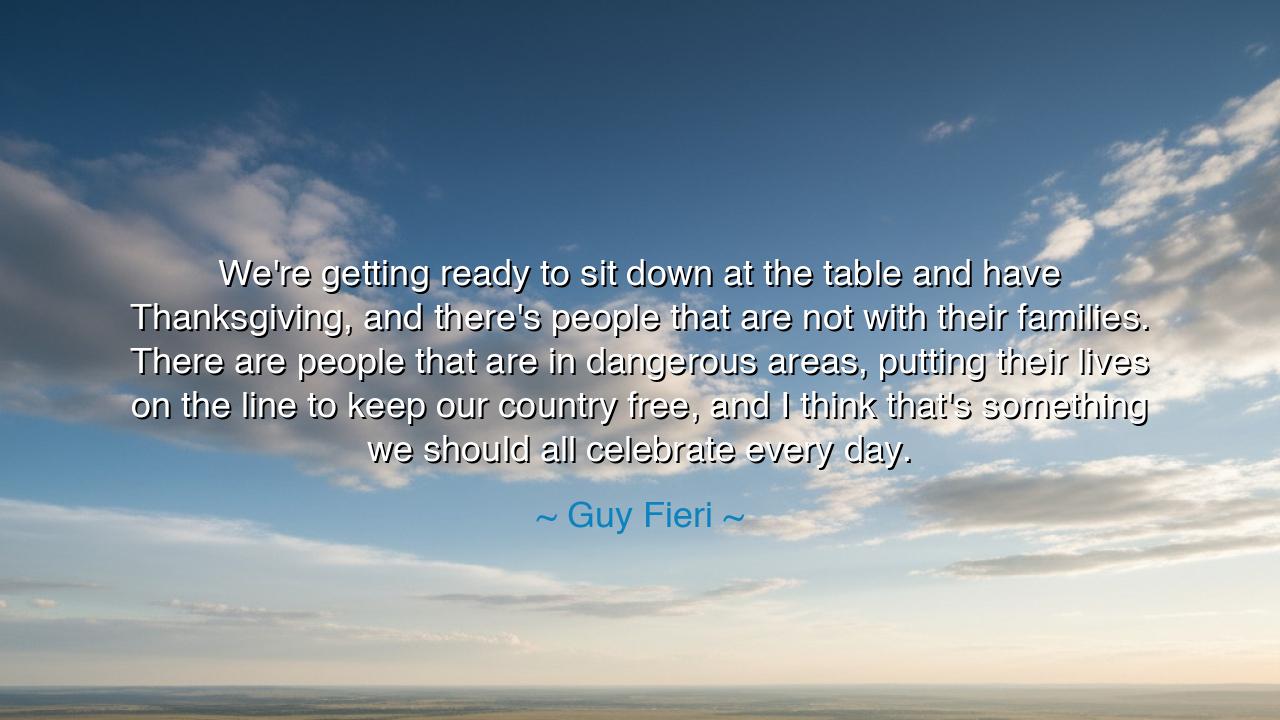
We're getting ready to sit down at the table and have
We're getting ready to sit down at the table and have Thanksgiving, and there's people that are not with their families. There are people that are in dangerous areas, putting their lives on the line to keep our country free, and I think that's something we should all celebrate every day.






Guy Fieri, a man known for food and fellowship, spoke words that rise beyond the kitchen when he said: “We're getting ready to sit down at the table and have Thanksgiving, and there's people that are not with their families. There are people that are in dangerous areas, putting their lives on the line to keep our country free, and I think that's something we should all celebrate every day.” In this saying, he lifts our eyes from the abundance of the table to the sacrifice of those who cannot partake in it. He reminds us that while we sit in warmth, others stand in peril; while we embrace kin, others guard the nation from afar. His voice is not merely celebratory, but reverent, calling us to a daily remembrance of sacrifice.
The origin of this reflection rests in the long tradition of associating Thanksgiving not only with harvest and plenty, but with gratitude for protection and survival. From the earliest feasts of the Pilgrims, who gave thanks for allies who had helped them endure, to Abraham Lincoln’s proclamation of Thanksgiving during the Civil War, the holiday has always carried the shadow of struggle and the light of gratitude. Fieri’s words remind us that in the modern age, the protectors are the men and women in uniform—soldiers, sailors, airmen, and marines—whose absence at the table is the price of our freedom to gather without fear.
History bears many examples of this truth. In World War II, American soldiers stationed in Europe or the Pacific would receive rations that barely resembled a feast—canned turkey, powdered potatoes, and a letter from home. Families back in the United States, enjoying their own Thanksgiving dinners, often left an empty chair to symbolize the loved one in uniform. The feast was seasoned not just with food, but with remembrance and longing. It is this same spirit that Fieri calls us to embrace—not once a year, but every day.
There is also a moral urgency hidden in his words. To celebrate those who “put their lives on the line” is not to glorify war, but to honor sacrifice. These are individuals who leave their families, their comforts, and often their safety, so that others may live with security. Their courage turns our ordinary lives—school runs, shared meals, quiet nights—into gifts we scarcely recognize. Fieri challenges us to awaken to this truth: that freedom is not cheap, and gratitude is not seasonal.
The deeper meaning is not limited to soldiers alone. In his words, one can also hear the echo of all who stand in dangerous places for the good of others: firefighters who leave their own tables to battle flames, doctors and nurses who work through holidays in crisis, and first responders who guard our communities when others rest. These too are absent from the feast, because their calling is to protect life. To honor them is to widen the circle of Thanksgiving until it includes not only kin, but also guardians, seen and unseen.
The lesson for future generations is profound: gratitude must become a way of life, not a single day. Do not let Thanksgiving end when the table is cleared. Carry remembrance into every morning, every prayer, every act of service. Speak of those who sacrifice, so that children learn not only to enjoy abundance, but also to revere the cost of its preservation. Gratitude without remembrance is shallow; gratitude with remembrance becomes holy.
Practical wisdom flows from this truth. When you gather for Thanksgiving, pause not only to bless the food but also to remember the absent. Set aside a place at the table, light a candle, or speak aloud the names of those serving far from home. Write letters to soldiers, volunteer for veterans, support families whose loved ones are deployed. And in ordinary days—when the holiday glow has faded—continue to practice gratitude: thank the unseen, serve the weary, and live with awareness that freedom and peace are precious.
Thus, Guy Fieri’s words rise above the holiday into the realm of eternal teaching. Thanksgiving is not only a feast of food but a feast of gratitude for those who secure our peace. Celebrate their courage not once a year, but always. Teach your children to carry this remembrance in their hearts, and in doing so, you will honor both the feast and the freedom that makes it possible. For the true measure of Thanksgiving is not what is on the table, but whom we remember beyond it.






AAdministratorAdministrator
Welcome, honored guests. Please leave a comment, we will respond soon